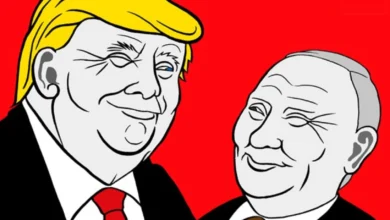Trends
BJP Accuses U.S. Of Colluding With The Opposition !
BJP spokesman Sambit Patra made allegations against the U.S. State Department of trying to hinder the growth of the country.

Narendra Modi, the Indian Prime Minister and the leader of BJP, has in the past crafted a narrative that the “outside forces” are trying to hamper the harmony inside the country, in an attempt to defy any sort of criticism and to speak in the defence of the policies pursued by his cabinet.
In recent years, the BJP has manyatimes accused foreign governments, international groups, and investigative journalists of trying to destabilize India. The latest allegations are that the U.S. State Department and the Organized Crime and Corruption Reporting Project (OCCRP) are behind a campaign against India’s leadership. The BJP says these efforts are malicious, intended to tarnish Modi’s image and hinder the country’s development.
The U.S. Embassy spokesperson stated, “The U.S. government collaborates with independent groups on programming in support of professional development and capacity-building training for journalists. These programs do not compromise or influence the editorial decisions and direction of these groups. The United States has long been a bastion of media freedom internationally. A free and independent press is an integral part of any democracy, facilitating good and informed debate and responsibility to those in power.”
“It is disappointing that the ruling party in India would make these kinds of accusations,” said a spokesperson for the U.S. Embassy.
 The BJP spokesman, Sambit Patra, had earlier claimed that elements in the U.S. “deep state” had colluded with a group of journalists and with Leader of Opposition Rahul Gandhi to put a spoke in the wheel of India’s growth story with unsubstantiated allegations without a “shred of evidence”.
The BJP spokesman, Sambit Patra, had earlier claimed that elements in the U.S. “deep state” had colluded with a group of journalists and with Leader of Opposition Rahul Gandhi to put a spoke in the wheel of India’s growth story with unsubstantiated allegations without a “shred of evidence”. He suggested all this is in conjunction with the U.S. State Department. The BJP also attacked Gandhi for using reports from the Organized Crime and Corruption Reporting Project, which it described as “singularly focused” on attacking Adani Group and the latter’s closeness to the government to attack PM Modi with “baseless” charges.
The immediate trigger for these allegations is Gautam Adani‘s and others’ indictment in a $265 million bribery case in the U.S. Rather than confronting the specifics of the allegations head-on, the BJP has diverted attention to a narrative of Western manipulation. Party leaders cited a French media report suggesting that OCCRP receives substantial funding from the U.S. Agency for International Development (USAID), framing this as evidence of a coordinated attack.
This is just one among such many conspiracy narratives. It forms part of an overarching narrative in which the BJP positions itself as a custodian of national interest, battling foreign hands who are said to be keen on reversing the course of India. This type of framing permits the party to redefine criticism as being constituent to a “deep state agenda,” hence both directing the conversation away from controversy and furnishing with an ethos of unity those members that support.
The Western Skepticism
 To understand the current stance of the BJP, it is very important to revisit the international treatment meted out to Narendra Modi in the early 2000s. The 2002 Gujarat riots was the defining moment for Narendra Modi. It greatly shaped his career as a political figure in India and marked him an international persona.
To understand the current stance of the BJP, it is very important to revisit the international treatment meted out to Narendra Modi in the early 2000s. The 2002 Gujarat riots was the defining moment for Narendra Modi. It greatly shaped his career as a political figure in India and marked him an international persona.The riots, which began from the burning of a train carrying Hindu pilgrims, resulted in more than 1,000 deaths, most of them Muslim. The incidents opened up communal tensions within the state. Modi was widely criticized for not having halted the violence in Gujarat when he was chief minister there, and for giving implicit sanction to the acts. Whatever his repeated denials of wrongdoing, the allegations brought widespread condemnation of him.
In 2005, the U.S. administration, under George W. Bush, for the first time denied Modi a diplomatic visa and revoked his tourist/business visa under section 212(a) (2)(g) of the Immigration and Nationality Act. Therefore keeping him locked out on international affairs. It claimed that the visa was revoked as Modi was accused of “severe violations of religious freedom,”.
Other Western countries also distanced themselves so it is safe to say that these were but manifestations of larger concerns from his regime’s handling of violence over issues of communalism to his siding with Hindutva ideology.
For Modi, this period of international boycott became the most important constituent of his narrative. Rather than accepting it as a repercussion of his actions, Modi had reframed it as an inappropriate targeting of a leader, who in fact was serving India towards its development. The refusal of a U.S. visa to him became a metaphor of western hypocrisy in his political story.
While Modi has successfully transformed his and the nation’s International image and has established India as a key player in international diplomacy, making alliances with countries that had once turned their back on him.The BJP’s allegations against the U.S. State Department shows that their habit of blaming the “outside forces” is not gone yet and that they continue to brand foreign criticism as remnants of colonial and interventionist attitudes.
Weaponizing Nationalism: The BJP’s Communication Strategy
It is not only a strategy of defense, but rather an explicit communication strategy also, valuable to BJP for political reasons aplenty. Party criticism, in turn, is cast as part of a world-wide conspiracy, which does both things – elevate the party’s nationalist credentials and discredits its critics.
This method speaks to many Indians who are distrustful of Western governments and institutions. Memories of colonial exploitation and of post-independence intervention still hold strong and thus supply fertile soil for the myths of manipulation by the outside. Portraying itself as a safeguarding force of Indian sovereignty, the BJP draws support from the people who hold aversion to foreign intervention.
It displays this approach by the controversy surrounding the Adani Group and allegations of using Pegasus spyware. Other than immediately playing down the allegations as being politically motivated attacks hatched by international agencies, the BJP went about asking questions about the funding and missions of groups like OCCRP, thereby centering the argument around the credibility of investigative journalism, while conveniently avoiding substance.
The BJP has also come to blame its political opponents like Congress leader Rahul Gandhi for colluding with outside forces to destabilize India. It employs a strategy that not only shifts the narrative but also undermines the legitimacy of the opposition.
Geopolitical Complexities
 Modi’s transformative diplomatic journey from not being granted access to the United States to becoming one of the most prominent leaders on this planet is a very fascinating case of political reinvention-it speaks to his personal durability also as to the larger shifts in international politics.
Modi’s transformative diplomatic journey from not being granted access to the United States to becoming one of the most prominent leaders on this planet is a very fascinating case of political reinvention-it speaks to his personal durability also as to the larger shifts in international politics.Since becoming Prime Minister, Modi has nurtured close relationships with world powers, including the U.S. His government has made India an indispensable partner in addressing global challenges like climate change, counterterrorism and economic development. Defense agreements, joint military exercises and an expanding trade relationship affirm a strategic partnership between New Delhi and Washington.
But these victories have come against a backdrop of tension. For instance, the allegations which the BJP throws at the U.S. State Department provides a sound example of this duality sitting comfortably together; cohabitation of cooperation and conflict. Just as the Modi government is keen to pursue strategic partnerships, it leaves no opportunity to cash in on any divergence, to reinforce its nationalist narrative.
The United States responded with a more measured approach — seeming to champion independent journalism while denying any role in editorial decisions. This, again, underscores the different ways of talking between these two governments: the BJP’s confrontational-tongue and the U.S.’s diplomat-speak.
BJP’s Narrative
It does have broad implications in this sense-that it allows the BJP to present themselves as a staunch advocate for sovereignty, which promotes loyalty among its base but can alienate parts of society who believe strongly in free speech and independent journalists.
This adds a layer of complexity to India’s relationships in the world with Western allies. The U.S., among others, has strategic interests with India.However, constant allegations of repeat China-style interference could call such a diplomatic relationship into question. Additionally, this evokes the challenges that are forthcoming in operating in a multipolar world where nationalism often runs into globalism, at least in how the BJP addresses the problem at hand.
It is indeed a daunting task for Modi to balance his domestic political imperatives with the needs of international diplomacy. He does so by not answering any or all questions posed by the opposition. Further the fact that the Modi government has not held a single press-conference in the past decade speaks for itself how our PM avoids any criticism. Blaming the outside forces is an easier task for the government than to actually take responsibility for the regular unrests caused by the words and actions of its politicians.
As our country is on its journey of emergence as a world power, domestic politics and international relations are likely to continue their intricate play as a defining feature of India’s political landscape. We all know that the U.S. always chooses the side which provides him more profit, it will be exciting to watch how they counter any future allegations by the ruling party.




